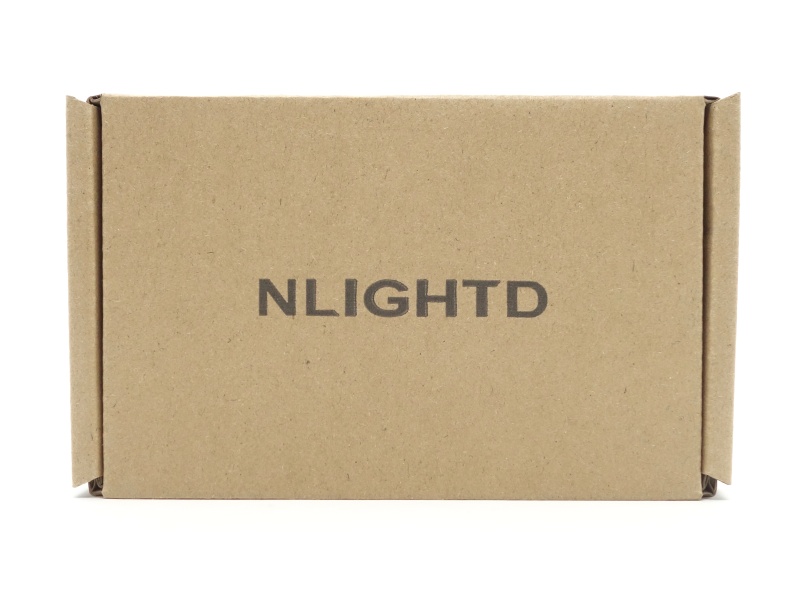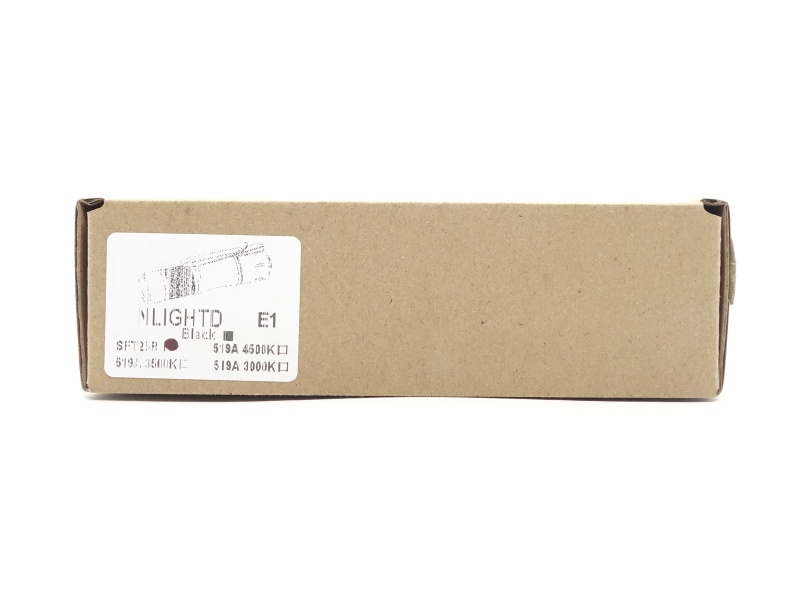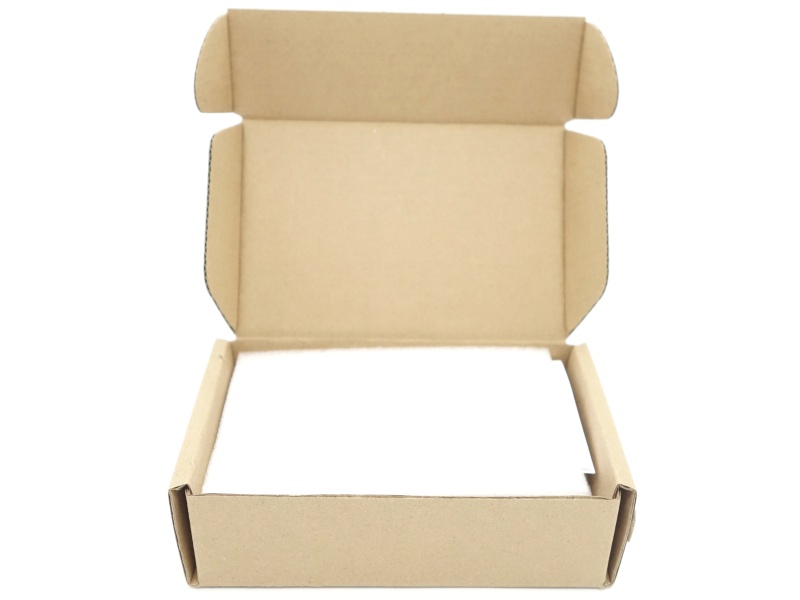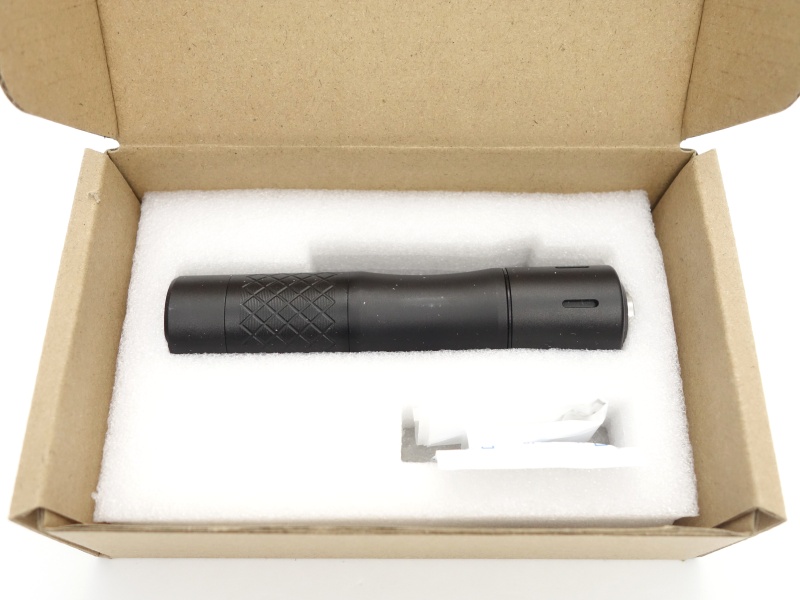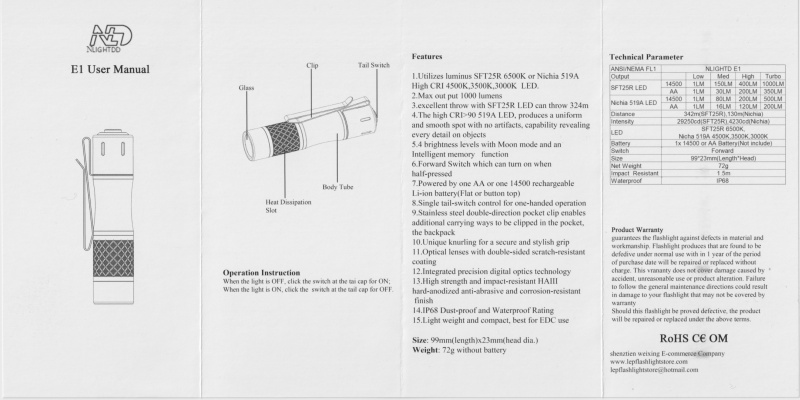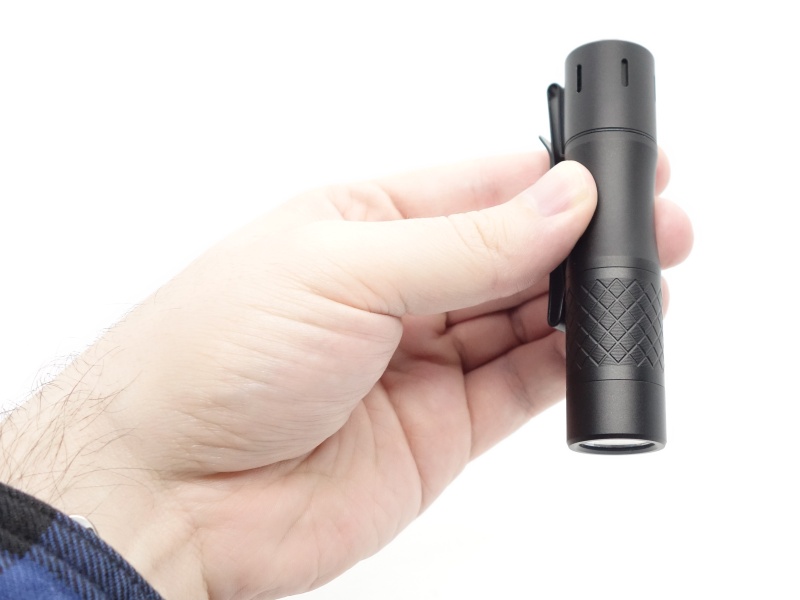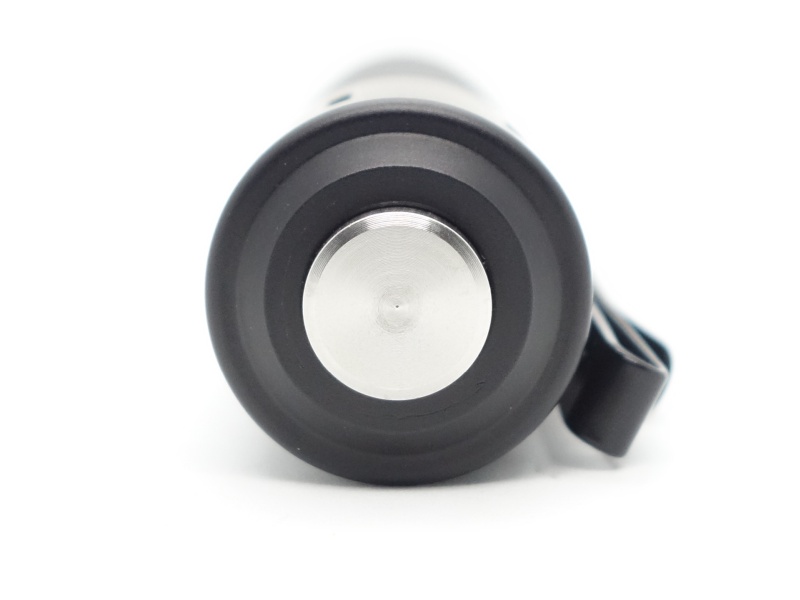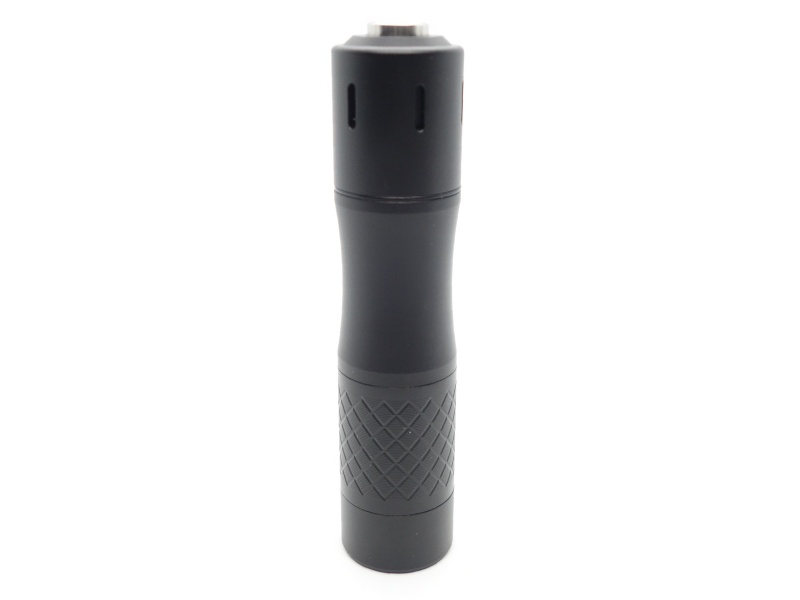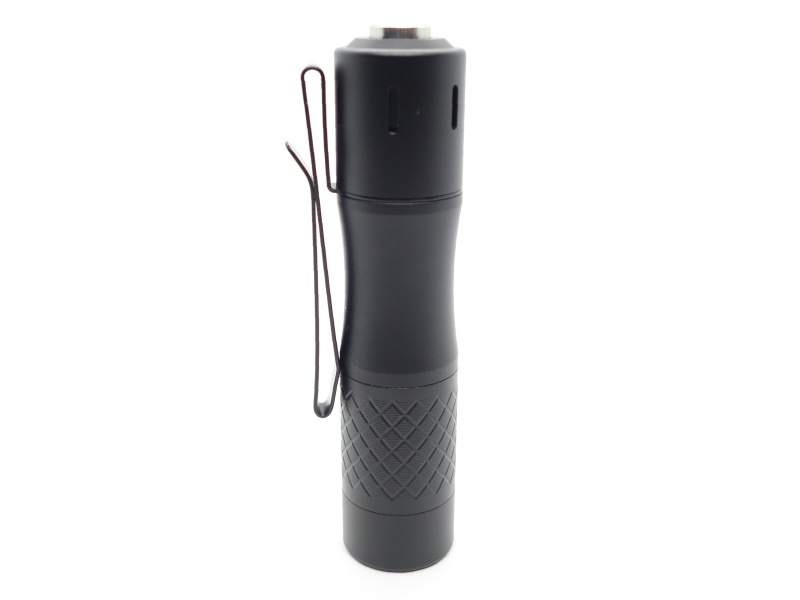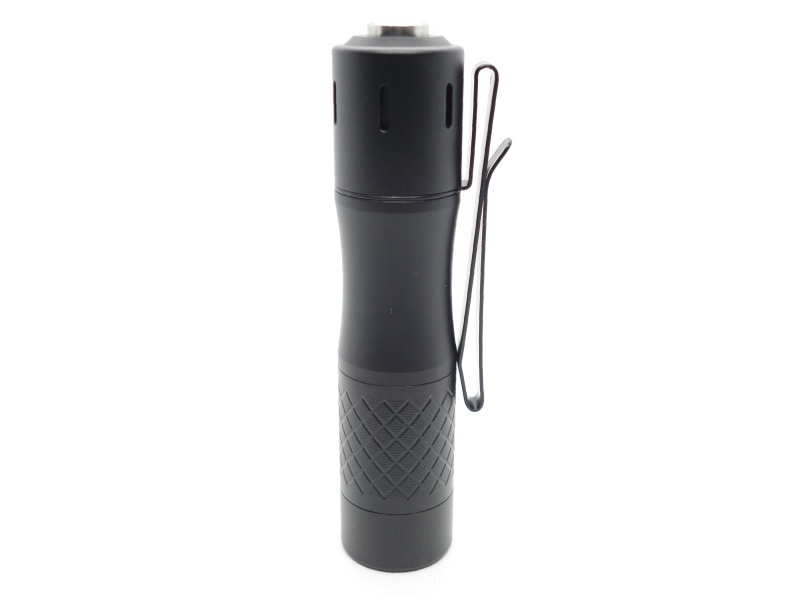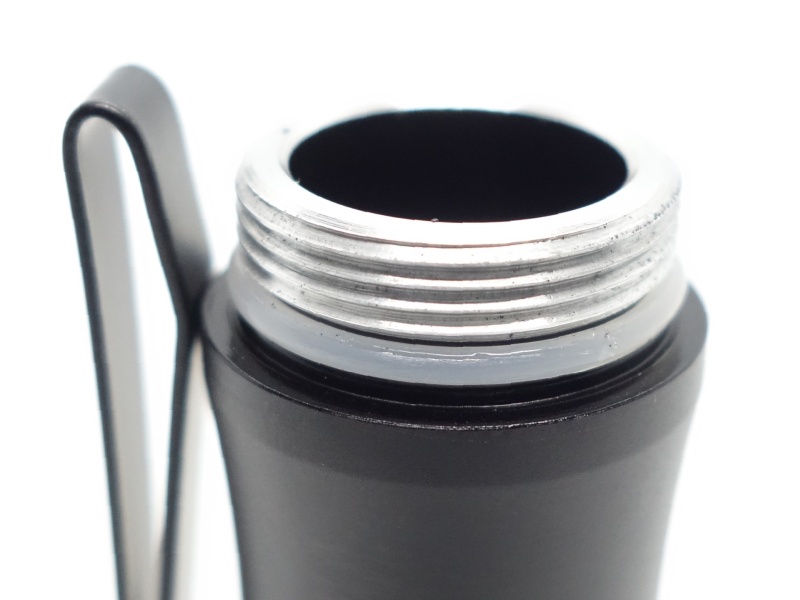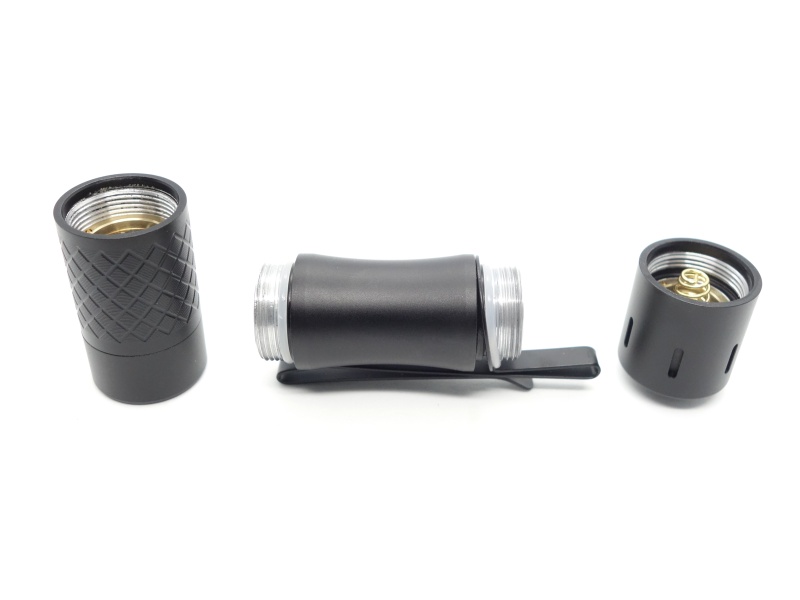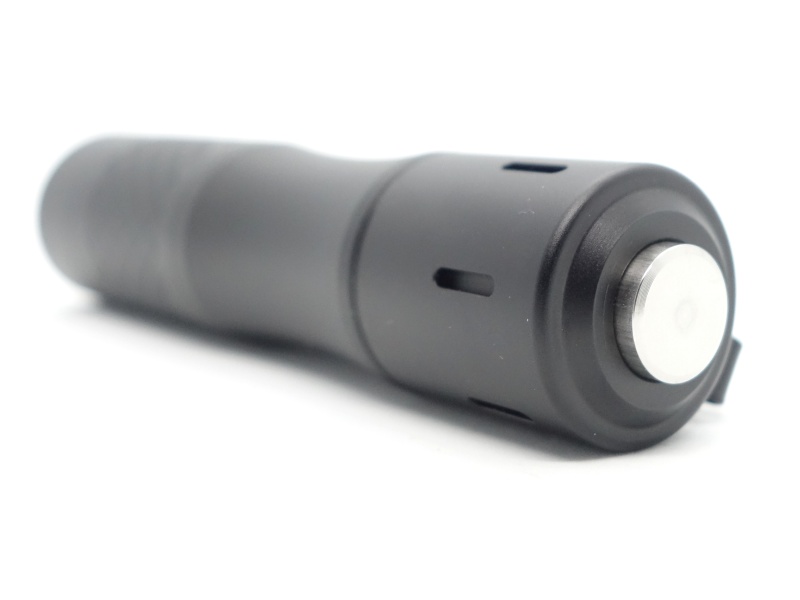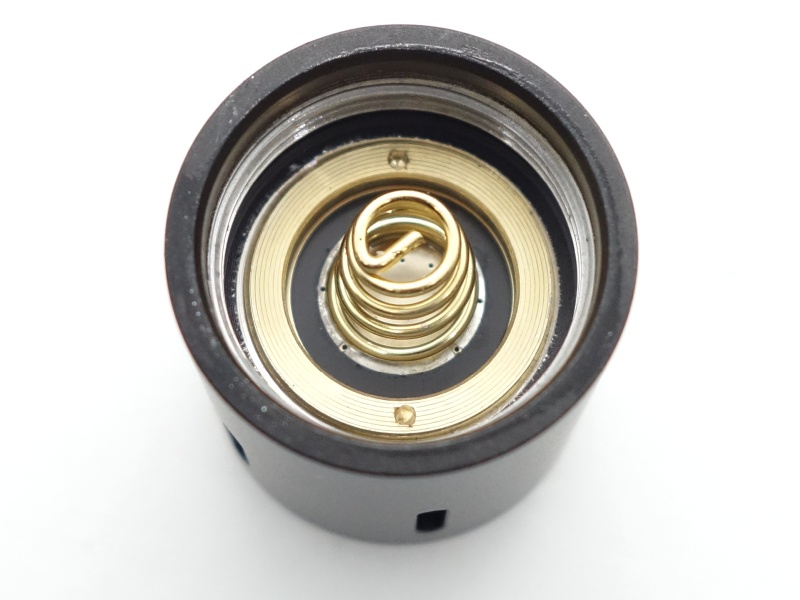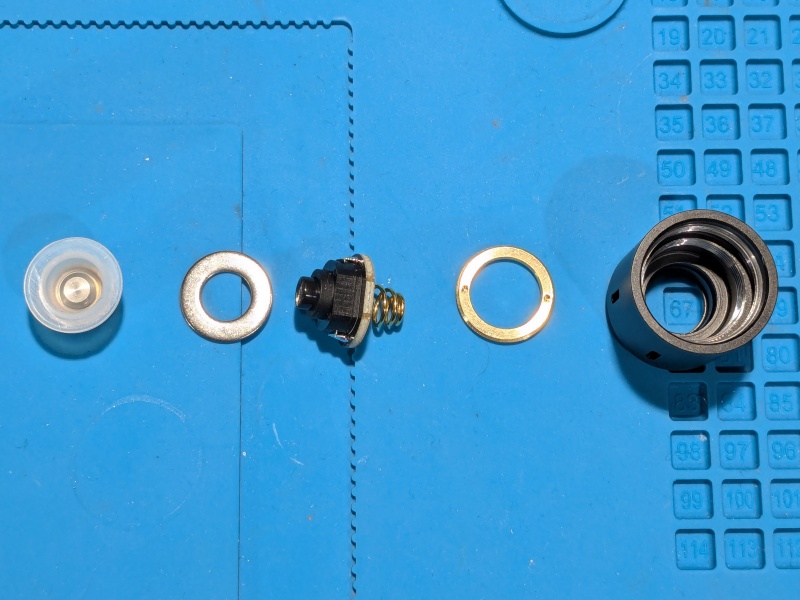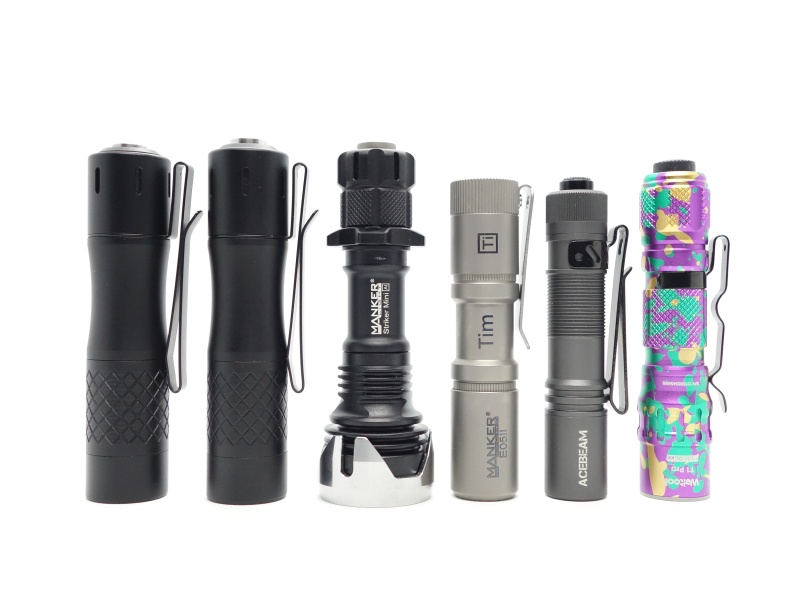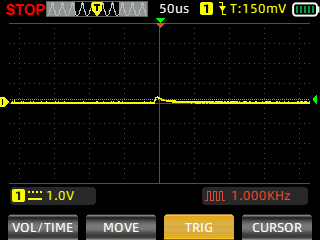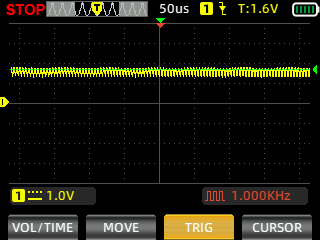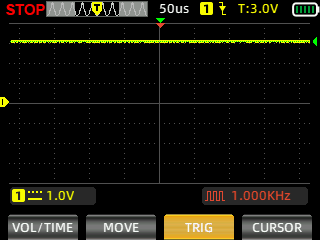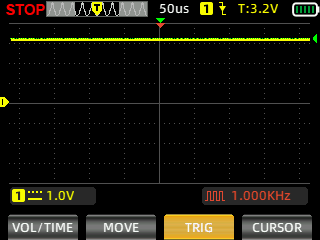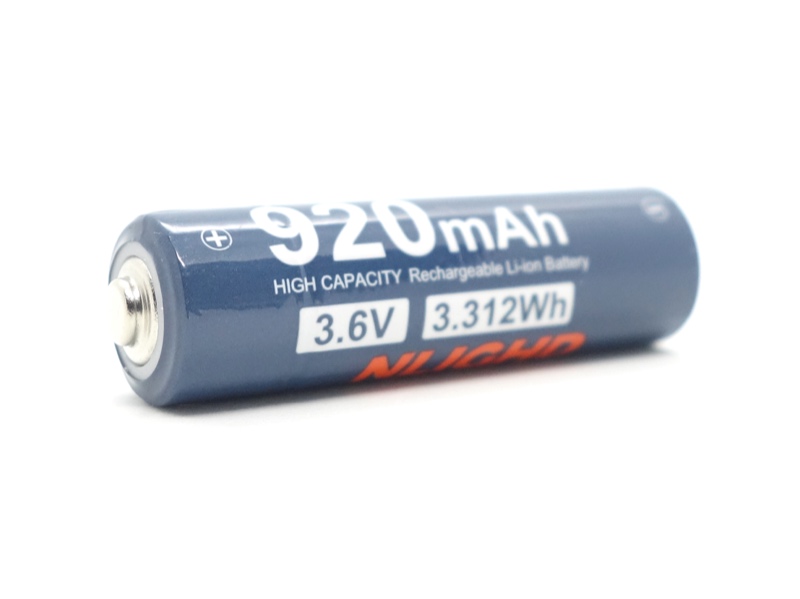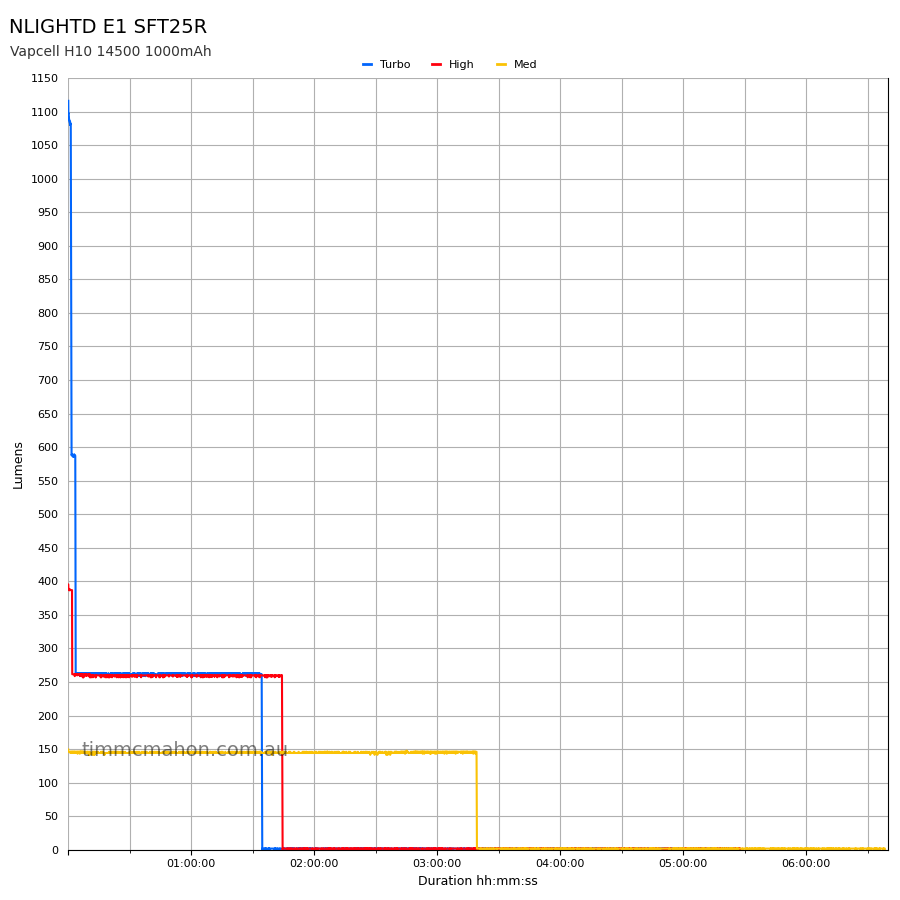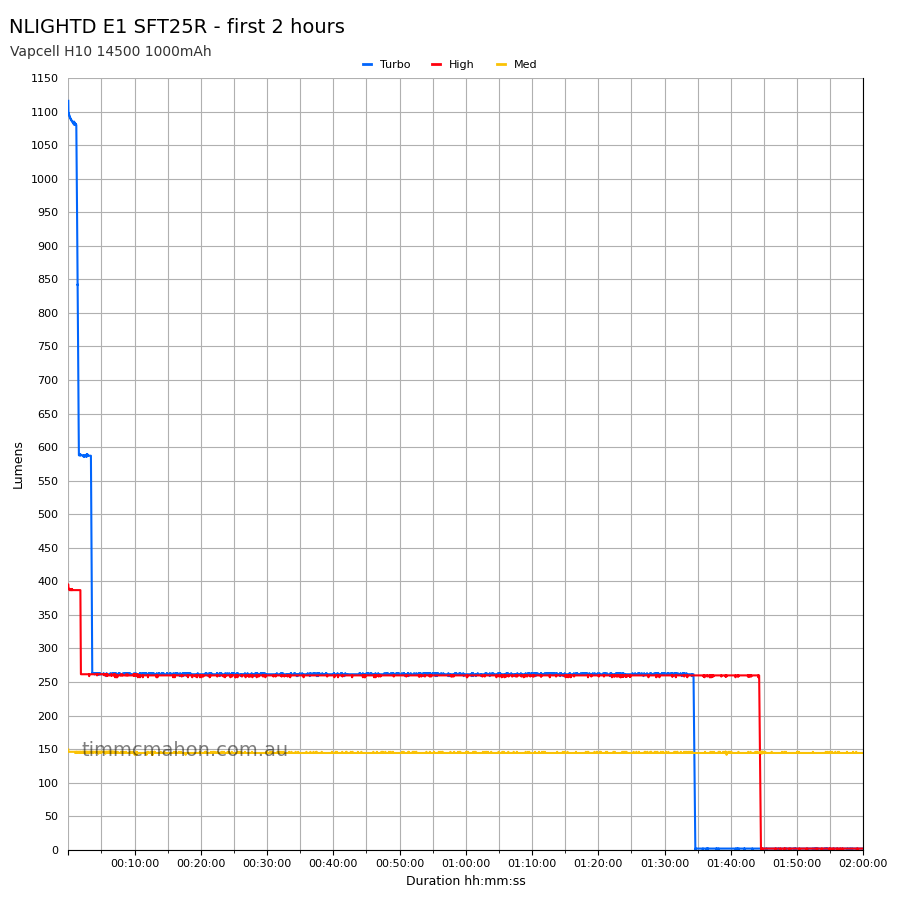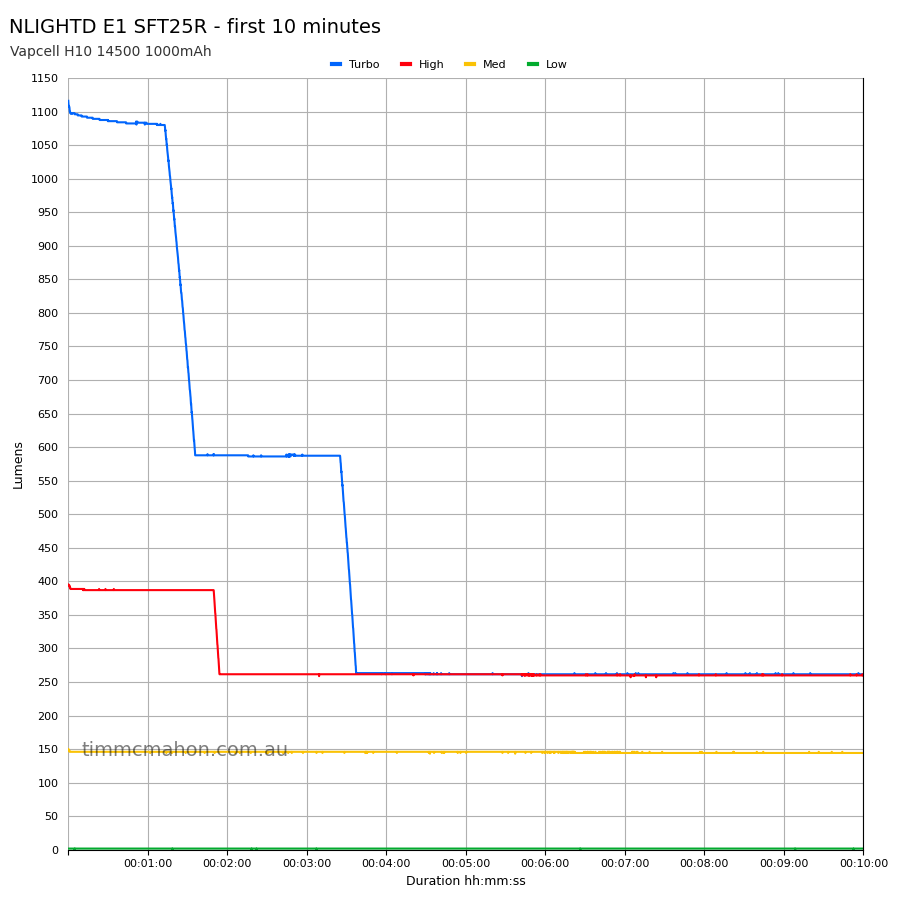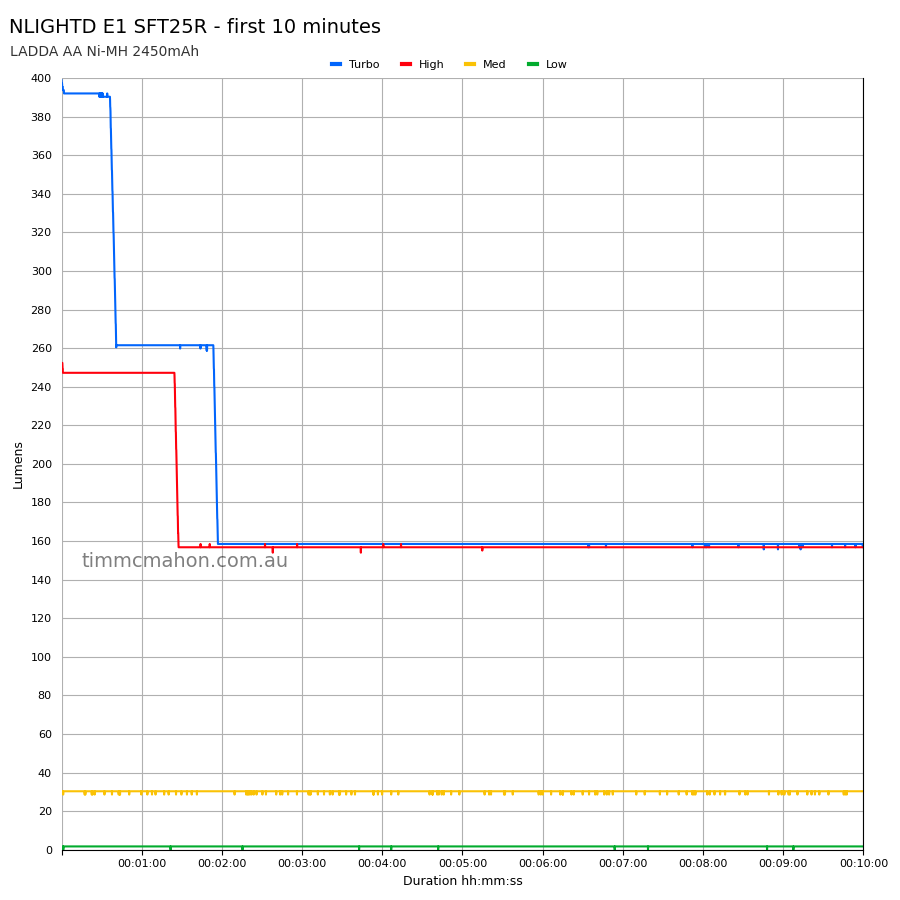NLIGHTD E1 SFT25R Torch Review

NLIGHTD E1#
- Specifications
- Introduction
- Torch in use
- Build quality
- LED, bezel, lens, reflector and beam
- Size and comparison
- User interface
- Batteries and charging
- Performance
- Beamshots
- Conclusion
- Price
- Product page
Specifications#
| Brand/model | NLIGHTD E1 |
|---|---|
| LED | Luminus SFT25R 6500K |
| Maximum lumens | 1,000 lm |
| Maximum beam intensity | 29,250 cd |
| Maximum throw | 342 m |
| Battery | 1*AA Ni-MH, 1*14500 Li-ion |
| Onboard charging | No |
| Material | Aluminium |
| Modes | 4 |
| Blinkies | - |
| Reflector | Smooth |
| Waterproof | IP68 |
| Review date | November 2024 |
Introduction#
The NLIGHTD E1 is a small AA-sized torch with a forward-clicky tail switch. It is available in black aluminium, white MAO aluminium, copper, polished titanium and stonewashed titanium. And there are multiple LEDs to choose from!
I recently reviewed the small NLIGHTD L2 LEP.
The E1 is the LED version of the L2 but there have been a few improvements:
- It supports AA Ni-MH, AA Alkaline, 14500 3.7V Li-ion (flat or button top).
- The tail switch feels firmer.
- The tail section is slightly longer.
Darren Yeo mentioned a pretty cool idea in his video “The Ultimate Travel Flashlights: My Top 4 Picks!” while travelling around Europe. Instead of carrying two torches, he brought a Convoy S8 with a throw Osram emitter and a spare Convoy S2 head with a Nichia 519A emitter. This allowed him to easily switch from a torch that produces a throwy beam to a torch with a nice soft beam by swapping the heads.
You can get the E1 head only.
NLIGHTD is a brand by nealsgadgets.com.
Neal kindly provided this torch for review. I have not been paid for this review nor have I held back my opinions of this torch.
Packaging#
The NLIGHTD E1 comes in a box with the NLIGHTD logo on the top. There is foam to protect the torch and the accessories.
The following was included in the box:
- NLIGHTD E1.
- Pocket clip.
- Two spare o-rings.
- User manual.
Torch in use#
The NLIGHTD E1 fits well in my hand. It feels smooth.
The tail switch feels firm.
The button sticks out so the light cannot tail stand easily.
The deep carry pocket clip allows the light to fit discretely in my pocket. That said, it is a bit on the large size for an AA-sized light.
Build quality#
The body of this version of the NLIGHTD E1 is made of aluminium and it has a matte black anodised finish.
I noticed that the anodising wears off easily where the head and the tube screw together.
I would recommend getting copper or titanium if you are worried about scuffing the finish of aluminium.
Knurling on the head provides some grip.
The threads came well lubricated and there is an o-ring at each end. The threads will become dirty over time.
The two-way pocket clip fits securely around the tube and it is held in place by the tailcap.
The torch came with some protective film on the lens to remove.
Tritium vials, or glow sticks, can be added to the six slots around the tail.
Button top and flat top cells now fit! The E1 driver has a small positive terminal and the tail is slightly longer.
The torch appears to have physical reverse polarity protection. I put a flat top 14500 cell in backwards and I tried to turn the torch on. The torch did not turn on. The torch continued to work properly after I put the cell in the correct way.
The retaining ring in the tail can be unscrewed to access the switch.
It will be cool to see what mods people come up with!
LED, bezel, lens, reflector and beam#
This NLIGHTD E1 came with a Luminus SFT25R 6500K emitter.
There are multiple emitter options available:
- Luminus SFT25R 6500K
- Nichia 519A 3500K High CRI
- Nichia 519A 4500K High CRI
- Nichia 219B 3000K High CRI
- Nichia 219B 3500K High CRI
- Nichia 219B 4500K High CRI
There was a hiccup with the first batch where Nichia 219B emitters were installed instead of 519A.
The bezel can be unscrewed to reveal a glass lens with an o-ring between it and the smooth reflector.
The reflector is sitting on a circular gasket to keep it centered around the LED.
The Nichia emitters come with an OP (orange-peel) reflector.
CCT, CRI, and duv#
I have taken Correlated Colour Temperature (CCT) and Colour Rendering Index (CRI, RA of R1-R8) measurements with the torch positioned one metre away from an Opple Light Master Pro III (G3).
The CCT is around 5500K, the CRI is around 61 and the Delta u, v is positive (green).
The beam produced has a narrow an intense white hot spot surrounded by a slightly green corona and a darker spill. The outer ring of the spill looks a bit brighter.
| Cell | Mode | CCT (K) | CRI (Ra) | x | y | Duv |
|---|---|---|---|---|---|---|
| 14500 | Low | 5391 | 60.5 | 0.3355 | 0.3724 | 0.0140 |
| 14500 | Med | 5508 | 61.2 | 0.3323 | 0.3677 | 0.0131 |
| 14500 | High | 5590 | 62.1 | 0.3302 | 0.3632 | 0.0119 |
| 14500 | Turbo | 5705 | 63.4 | 0.3274 | 0.3569 | 0.0101 |
Calculate Duv from CIE 1931 xy coordinates
Dimensions and size comparison#
Dimensions#
I took the following measurements using a digital caliper.
| Measurement | Unit (mm) |
|---|---|
| Length | 102.85 |
| Head diameter | 23.04 |
| Tail diameter | 23.00 |
| Button diameter | 10.69 |
| Tritium slot | 1.6 * 7.4 |
| Battery length | 49.1 |
I measured a flat top Vapcell H10 battery.
Weight#
I took the following measurements using a digital scale.
| Weight | Unit (g) |
|---|---|
| NLIGHTD E1 | 77.6 |
| Battery | 22.10 |
| NLIGHTD E1 with battery | 99.7 |
I measured a flat top Vapcell H10 battery.
Size comparison with its competition#
From left to right: NLIGHTD L2 LEP, NLIGHTD E1, Manker Striker Mini, Manker E05 II, Acebeam Pokelit AA Gray, Weltool T1 Pro V2
User interface#
The NLIGHTD E1 has a forward-clicky tail switch.
There are four modes in the main group: Low, Med, High and Turbo
| State | Action | Result |
|---|---|---|
| Off | Half press | Momentary on (mode memory) |
| Off | Half press within 1 second | Cycle (Low, Med, High, Turbo) |
| Off | Click | On (mode memory) |
| On | Click | Off |
Mode memory#
There is mode memory.
The torch will use the last used mode when turning the torch back on.
Strobe#
There does not appear to be a Strobe mode.
Low voltage protection#
Low voltage protection works sometimes.
It failed at the end of a runtime test for 14500 Med where the voltage had dropped to 2.02V. I tested it again with anoterh 14500 Med runtime and the voltage was 1.37V after 12 hours from the time the light was turned on.
I recommend using a protected 14500 3.7V Li-ion cell. The NLIGHTD 14500 920mAh USB-C Rechargeable Li-ion cell can be selected when ordering the NLIGHTD E1 or it can be purchased separately.
I tested low voltage protection by connecting the driver of the torch to a bench power supply and then by lowering the voltage from 4.2V to 0V for a 14500 Li-ion cell, and from 1.5V to 0V for a Ni-MH cell.
| Cell | Mode | LVP? | Cut-off | Current |
|---|---|---|---|---|
| 14500 | Low | Yes | 2.73V | 12.58 mA |
| 14500 | Med | Yes | 2.80V | 0.007 A |
| 14500 | High | No | 2.33V | 0.012 A |
| 14500 | Turbo | No | 2.32V | 0.012 A |
| Ni-MH | Low | Yes | 0.45V | 0 A |
| Ni-MH | Med | Yes | 0.44V | 0 A |
| Ni-MH | High | Yes | 0.40V | 0 A |
| Ni-MH | Turbo | Yes | 0.41V | 0 A |
Pulse Width Modulation#
I did not notice any visible PWM (flickering).
I measured the PWM of the light with a Zoyi ZT-703S oscilloscope.
14500 (Low, Med, High, Turbo)
What I like about the UI#
- Simple.
- Forward-clicky tail switch.
What could be improved#
- A Strobe mode would be nice.
Batteries and charging#
Battery#
AA Alkaline, AA Ni-MH, 14500 3.7V Li-ion (flat or button top) work in the NLIGHTD E1.
The NLIGHTD E1 can be ordered with or without a 14500 3.7V Li-ion cell.
The NLIGHTD 14500 920mAh USB-C Rechargeable Li-ion cell can also be purchased separately.
| Cell | Top | Compatible? | Comment |
|---|---|---|---|
| eneloop pro AA 1.2V Ni-MH 2450mAh | Button | Yes | |
| LADDA AA 1.2V Ni-MH 2450mAh | Button | Yes | |
| XTAR AA 1.5V Li-ion 2500mAh | Button | Yes | |
| Weltool UB14-09 3.6V Li-ion 14500 900mAh | Button | Yes | |
| Vapcell H10 14500 3.7V Li-ion 1000mAh | Button | Yes | |
| Vapcell H10 14500 3.7V Li-ion 1000mAh | Flat | Yes | |
| Shockli Orange 14500 3.7V Li-ion 1000mAh | Flat | Yes |
Charging#
There is no built-in charging.
Performance#
Specifications from the user manual:
| ANSI/NEMA FL1 | LED | Cell | Low | Med | High | Turbo |
|---|---|---|---|---|---|---|
| Output (lumens) | SFT25R | 14500 | 1 | 150 | 400 | 1,000 |
| Output (lumens) | SFT25R | AA | 1 | 30 | 200 | 350 |
| Beam Intensity (cd) | SFT25R | 14500 | 29,250 | |||
| Beam Distance (metres) | SFT25R | 14500 | 342 |
I used an LADDA AA Ni-MH 1.2V 2450mAh cell and a flat top Vapcell H10 14500 3.7V Li-ion 1000mAh cell for the following tests.
Lumen measurements#
I used a UNI-T UT139C digital multimeter to measure the current for 14500 Low at turn on.
I used a bench power supply to measure the current at turn on for all other modes.
| Cell | Mode | Amps at start | Specs | Lumens @turn on | Lumens @30 sec | Lumens @10 min |
|---|---|---|---|---|---|---|
| 14500 | Low | 12 mA | 1 | 1 | 1 | 1 |
| 14500 | Med | 0.231 A | 150 | 149 | 145 | 144 |
| 14500 | High | 0.706 A | 400 | 395 | 386 | 259 |
| 14500 | Turbo | 2.880 A | 1,000 | 1,115 | 1,085 | 261 |
| Ni-MH | Low | 0.059 A | 1 | 1 | 1 | 1 |
| Ni-MH | Med | 0.191 A | 30 | 30 | 30 | 30 |
| Ni-MH | High | 1.550 A | 200 | 252 | 247 | 156 |
| Ni-MH | Turbo | 3.495 A | 350 | 398 | 390 | 158 |
Standby drain#
There is no standby drain. This torch has a forward-clicky tailswitch.
Runtime graphs#
I used my own DIY lumen tube with a TSE1591 sensor and forked bmengineer’s project RuTiTe to record runtimes.
Note: Lumen measurements may be off by 10% with my DIY lumen tube.
The room temperature was approximately 18 C.
14500#
Ni-MH#
Runtime#
Here is a summary of the runtime results:
| Cell | Mode | User manual | Runtime | Turn off | Final voltage |
|---|---|---|---|---|---|
| 14500 | Turbo | 1h 34min 31s | 5h 26min 8s | 2.72 | |
| 14500 | High | 1h 44min 30s | 5h 27min 48s | 2.81 | |
| 14500 | Med | 3h 19min 21s | 6h 38min 28s | 2.02 | |
| 14500 | Low | 10min+ | 10min+ | ||
| Ni-MH | Turbo | 2h 0min 27s | 2h 0min 31s | 0.89 | |
| Ni-MH | High | 2h 1min 7s | 2h 1min 10s | 0.85 | |
| Ni-MH | Med | 10h 2min 1s | 10h 2min 4s | 0.83 | |
| Ni-MH | Low | 10min+ | 10min+ |
“Runtime” is the time until the output reduces to 10% of the output at 30 seconds (as per the ANSI/PLATO FL1 2019 Standard).
“Turn off” is the time until my DIY lumen tube no longer detects more than one lumen.
“+” indicates that the light remained on after recording had stopped.
The runtimes are pretty good.
The output is well regulated.
Throw#
I took lux measurements with a UNI-T UT383BT at 30 seconds. Low was measured at one metre. Med, High and Turbo were measured at five metres.
| Cell | Mode | Specs (cd) | Specs (m) | Candela measured (cd) | Distance (m) |
|---|---|---|---|---|---|
| 14500 | Low | 37 | 12 | ||
| 14500 | Med | 3,850 | 124 | ||
| 14500 | High | 10,550 | 205 | ||
| 14500 | Turbo | 29,250 | 342 | 29,800 | 345 |
Beamshots#
I went to a local park and aimed the torch at a tree 70 metres away while using Turbo.
Beamshots were taken using a Sony RX100M2 using 3.2", f3.2, ISO 100, 5000K WB.
NLIGHTD E1 14500 (Turbo)#
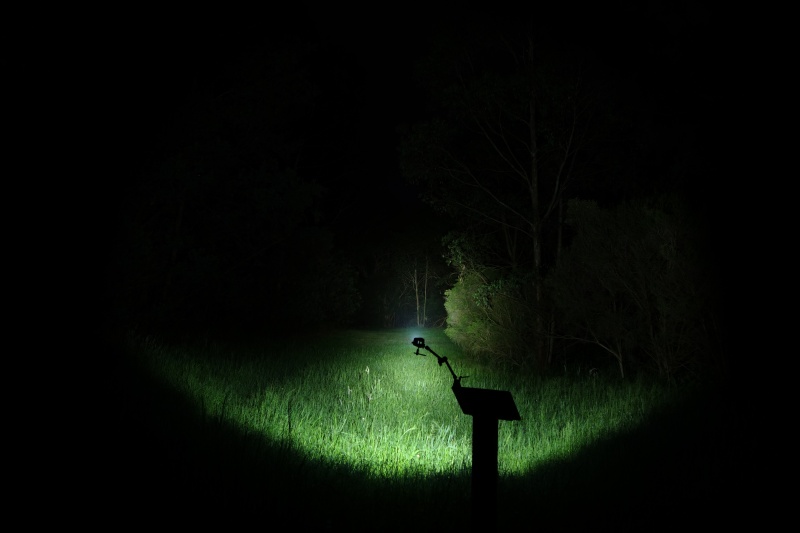
Manker Striker Mini (High)#
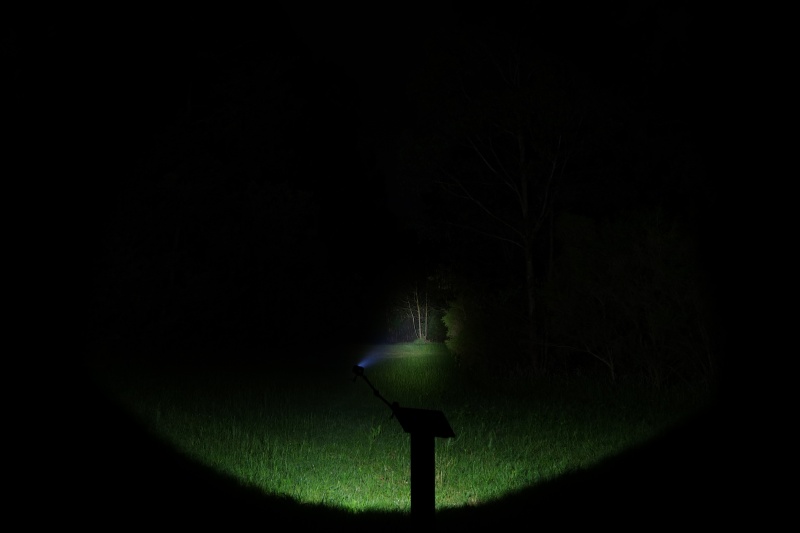
Manker E05 II (High)#
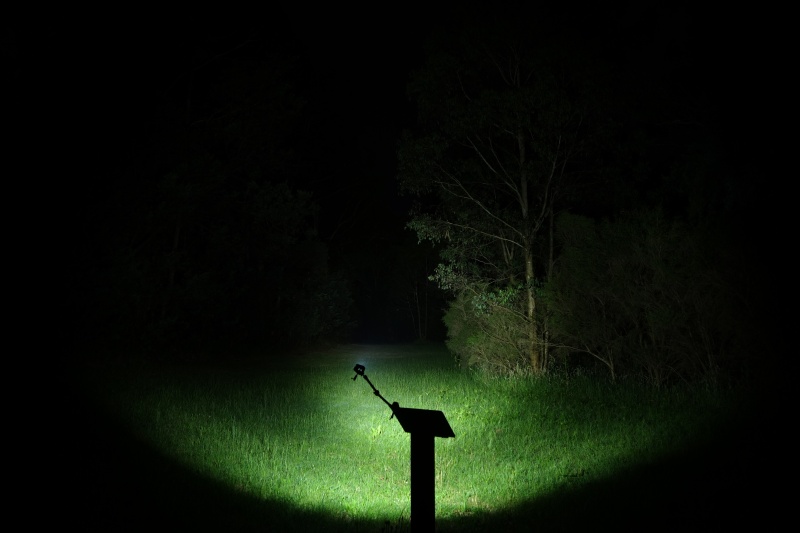
Acebeam Pokelit AA Gray (High)#
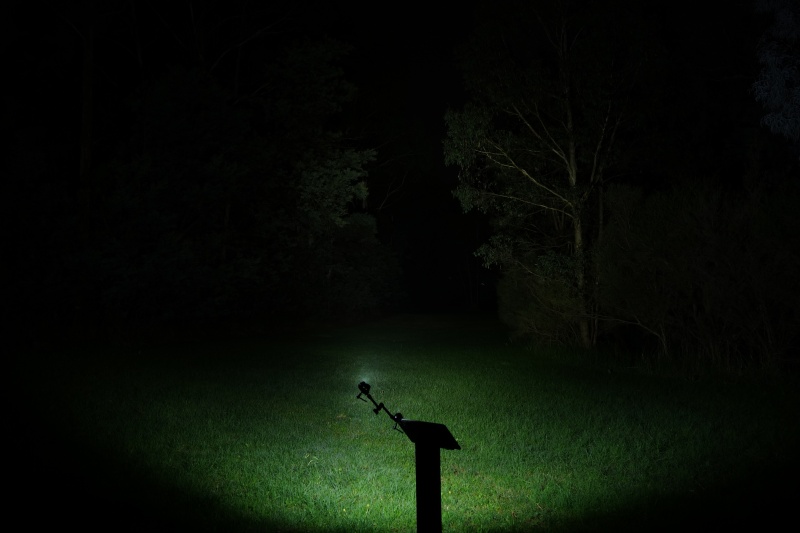
Weltool T1 Pro V2 (High)#
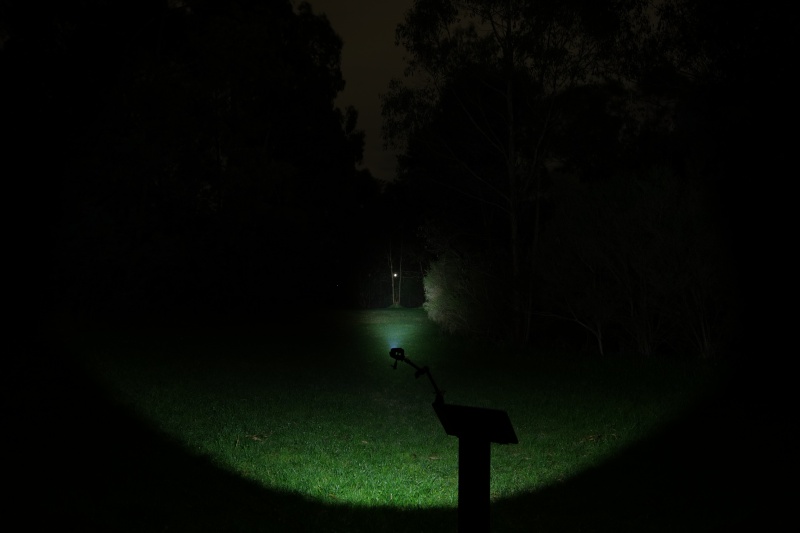
Conclusion#
The NLIGHTD E1 is the LED version of the NLIGHTD L2.
The E1 is definitely a bit large for an AA-sized EDC torch but Nealsgadgets has created a platform where you can mix and match parts from the E1 and L2 because the dimensions are almost the same.
There have been some interesting mods where people have personalised their L2 by using different parts.
The E1 with an SFT25R stands out compared to a bunch of other 14500-sized lights by producing a throwy and wide beam. You might wonder why you would get the E1 SFT25R over the L2 LEP. Well, the L2 LEP has a very narrow beam and the E1 SFT25R has a throwy and wide beam. The Manker E05 II comes close in terms of producing a wide beam but it does not reach as far.
The beam distance and lumen output that I measured are pretty close to what Nealsgadgets claims.
Nealsgadgets did not mention what the expected runtime should be. I measured it and you can see the results above.
The output is well regulated!
I noticed that low voltage protection did not always work. It failed once at the end of a runtime for 14500 Med where the voltage was 2.02V. Ideally it should not drop below 2.50V. It switched off a few times above 2.7V but it did go down to 2.32V a few times while testing it with a bench power supply.
The black anodising seems to wear off easily in places where there is a lot of friction (e.g. between the head and the tube when unscrewing). I would recommend getting copper or titanium instead if you are worried about anodising wearing off.
The CRI is pretty low for the SFT25R. I measured 61 CRI. I would not regard this as a negative though. You could select an high CRI emitter like the Nichia 219B or Nichia 519A.
If you like forward-clicky AA-sized torches then I highly recommend getting the NLIGHTD L2 LEP and the NLIGHTD E1 with a Nichia 219B or Nichia 519A emitter.
Pros:#
- Good beam distance.
- Good lumen output.
- Good runtimes.
- The output is well regulated.
- There are a lot of LED options!
- It supports AA Ni-MH, AA Alkaline, 14500 3.7V Li-ion (flat or button top).
- Simple user interface.
- Two-way pocket clip is securely attached and it can be easily removed.
Cons:#
- Low voltage protection sometimes does not work (recommend using a protected 14500 3.7V Li-ion).
Price#
The black aluminium NLIGHTD E1 SFT25R is US$25.97 from nealsgadgets.com when using the early bird coupon code NLDDEAL (35% off).
You can get the SFT25R head only for US$20.77 when using the discount code.
That 35% off code also works on the NLIGHTD L2 LEP. You can find my full review of the NLIGHTD L2 here.
Product page#
Promo code: TimMcAU
Promo code: TIMMC
NLIGHTD E1 at nealsgadgets.com (affiliate link)
I may earn a commission if you use an affiliate link or a promo code. This will help fund future torch reviews and tutorials.
